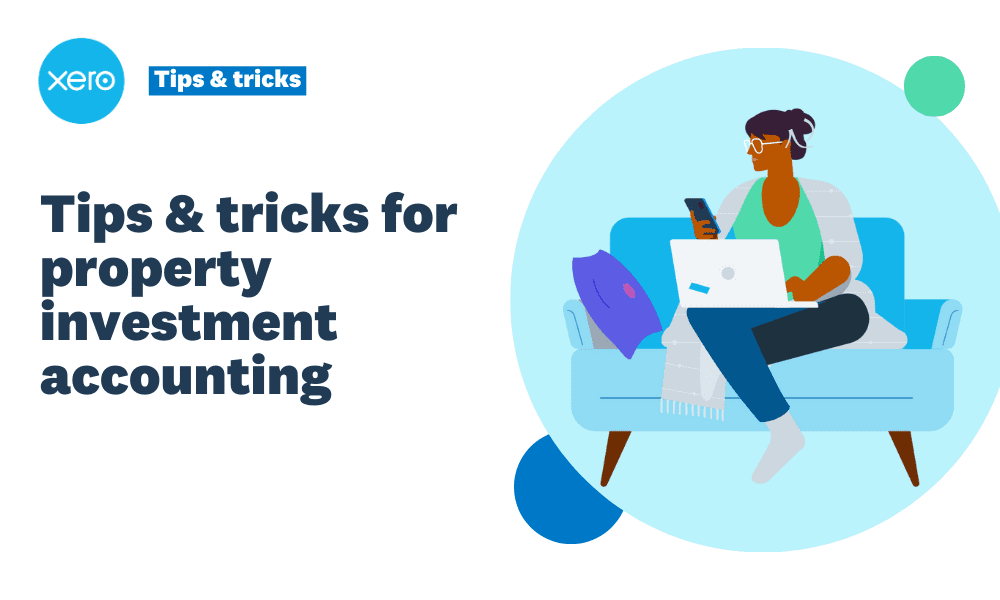
Australia’s current property market presents both challenges and opportunities, with changing tenancy rules and rental controls, and the impact of interest rates and cost of living pressures. It’s a complex outlook, but property investment is a marathon swim, not a quick body surf to shore.
Property investment accounting, or landlord accounting, manages your property portfolio assisting with tax compliance and return on investment. Your success lies in solid financial and legal foundations to weather storms – real or metaphorical. Here’s some tips, tricks, and insights to help you understand what’s involved, and how Xero can help you manage all your property finances in one place, giving you the freedom to free swim!
Know property investment accounting regulations and taxes
To swim well, you need to know the strokes, and how to navigate the water. It’s a good metaphor for succeeding in the property market – if you understand the rules you’ll know how to operate with security and confidence.
Four important property taxes
- Stamp Duty: A state/territory-based tax covering documents and transactions when you buy a property. How much it is depends on location, value, and any concessions you’re eligible for (e.g. property exchanged between spouses)
- Land tax: An annual tax paid to state/territory governments by landowners (except in the Northern Territory). Your primary residence is usually exempt. The amount varies depending on the combined unimproved value of your taxable property.
- Rental income tax: If you earn rental income, you’ll need to pay tax on it, calculated according to your tax bracket.
- Capital gains tax (CGT): Taxes on investment property in Australia are typically calculated based on the capital gain or loss made from a property sale. If you sell a property for more than the price you paid for it, plus incidental costs like legal fees, stamp duty, and real estate agent commissions, you might need to pay CGT. You may be eligible for some small business CGT concessions.
Read more about property investment taxes on the Australian Government business website.
Four impressive property investment tax benefits
Rental property expenses
Expenses related to leasing, managing, or maintenance of rental property may be tax deductible. The ATO categorises these into three groups: expenses claimable in the current financial year (e.g. loan interest, council rates, repairs), expenses claimable over multiple years (e.g. capital works, depreciating assets), and non-claimable expenses (e.g. personal expenses from property use).
Positive or negative gearing
If your deductible expenses are less than the income you earn from your property, it’s positively geared, indicating profit. Conversely, if expenses exceed your rental income, it’s negatively geared, resulting in a loss. In this case, you may be able to reduce your taxable income by claiming the full rental expenses. If your income isn’t enough to absorb the loss you may be able to carry it over. Xero can help you with real-time insights into how your rental income is balanced against some of the costs that may apply. Xero also provides automated daily bank reconciliation. As always, you should seek appropriate independent tax and financial advice that may be appropriate for your business.
Depreciation
You may be able to claim depreciation of your property. You’ll need a quantity surveyor to prepare a tax depreciation schedule.
Capital gains tax discount
If you’re an Australian resident for tax purposes and you’ve owned a property for 12 months or more, you may be able to claim a 50% reduction in CGT.
It’s important to keep on top of changing tax rules. This is where a property tax specialist will be worth their weight in gold. Read up on Australian tax rules for investment properties at the ATO website.
Know, and track, expenses
The other key to good swimming is breathing technique, a skill that becomes second-nature through practice. Good systems will save you from labouring over detail and give you confidence that your numbers are correct. From scanning receipts and turning them into categorised expense logs, to showing you in a snap real-time figures and reports, Xero’s expense tracking helps you to have visibility about your cash flow.
Four ways accountants categorise expenses
- Deductible versus non-deductible expenses: Whether an expense is or is not a tax liability (and therefore can or cannot be claimed).
- Direct versus indirect costs: Whether an amount is spent on producing a good or service for sale, or on general business costs.
- Fixed versus variable costs: Whether a cost stays roughly the same or goes up or down depending on your or your suppliers’ activity.
- Operating versus capital versus finance expenses: Whether an expense is for your daily business, an investment in property or tools, or a financing expense such as loan repayments.
Check out our glossary of expense terms for more detail.
Five reasons to track expenses
- Minimise waste: If you can’t see how your cash is flowing, you won’t know if there’s a leak.
- Minimise delays: If you can see how your cash is flowing, you’ll be able to act quickly when the time comes to invest more or apply for a loan.
- Minimise fines: Not to get too dramatic, but good property investment accounting will help keep you on the right side of the law! Stay organised, document, and hold onto all those receipts for at least five years.
- Minimise tax stress: Staying organised means categorised expenses, all logged and accurate, ready for tax time.
- Maximise tax deductions: Make it easy for your accountant, and the ATO, to see your legitimate deductions.
Take advantage of Xero’s know-how
Whether you’re working with a property accountant or going it alone, the smart investor leverages tools for streamlined administrative tasks and a constant big-picture view. Xero’s automated rent collection feature makes rental payments easy, cutting time wasted checking or chasing income.
Property accountants, and how to find one
How a specialised property tax accountant can help
A property accountant will help balance your books, give you accurate forecasts, and manage accounts payable and rental income. They’ll also be your lifeguard, to help protect you from fines or legal complications, and help you ride the favourable currents of tax breaks.
How to choose a property tax accountant
Consider your potential property tax accountant’s expertise, reputation, and compatibility. You’ll need someone who communicates effectively and understands your goals. Get recommendations from fellow investors, and check their credentials and if they’re registered as a Certified Public Accountant.
You can search for a Xero-savvy accountant or bookkeeper in our advisor directory, or use our match-making tool.
Let your accounting software do the hard paddling
Along with your property accountant, Xero is your gritty, tireless property investment accounting partner, keeping track of finances, automating rent collection, and managing tenancy records, among other useful things.
Xero can sync with other property management software and with your property tax accountant to keep information flowing. You’ll have more time to surf those waves of opportunity without scrambling around in the shallows.
Find out all about Xero’s features for landlords.
The information in this article should be used for general guidance only and you should seek appropriate tax, financial and legal advice as may be appropriate for your particular business needs.
Share this article
[addtoany]

